|
|
|
Sort Order |
|
|
|
Items / Page
|
|
|
|
|
|
|
| Srl | Item |
| 1 |
ID:
174030
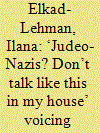

|
|
|
|
|
| Summary/Abstract |
This article demonstrates how experiences of voicing traumas in Israeli society are reflected in art through Ezekiel’s World, a graphic novel by Michael Kovner. The novel explores relations between Holocaust survivors and their children (and grandchildren), whose complexity embodies the moral significance of Holocaust memory for Israelis. Both generations are preoccupied with the Holocaust as an existential crisis that determines contrasting generational attitudes towards military service and the occupation, resulting in the sacrificing of children and conversely, the abandonment of parents. The polyphonic novel voices these interrelated traumas via intertextual relations between painting, narrative, poetry, and documentary.
|
|
|
|
|
|
|
|
|
|
|
|
|
|
|
|
| 2 |
ID:
172671
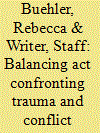

|
|
|
| 3 |
ID:
179515
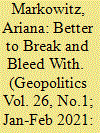

|
|
|
|
|
| Summary/Abstract |
This article is part of the small but growing methodology literature on emotion and trauma in social science research, particularly in relation to studying violence. I argue that, on top of shame around mental health in general and a reluctance to turn our gaze toward ourselves amidst the distress and suffering of our research participants, the weight of positivism in academia, even on those researchers who rebuke the paradigm, silences our ability to engage with what we see, hear, do, and feel as we gather information. Breaking this silence, rather than being unscientific or self-indulgent, promotes clarity in the theories, concepts, and methods we develop to make sense of violence as a social phenomenon. Equally important, learning from ‘helping professionals,’ including trauma therapists, human rights workers, and people involved in disaster relief, offers insight into how a trauma-informed ethics of care, grounded in a collective process of seeking and finding guidance and support, might look. I frame this article around a period of fieldwork in El Salvador that forced me to understand depths of misery and violence that I had never seen up close before. As I unravelled in response, I began to reckon with why I was unprepared and then gradually piece myself back together. I continue striving to soothe, fortify, and heal.
|
|
|
|
|
|
|
|
|
|
|
|
|
|
|
|
| 4 |
ID:
170707
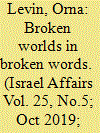

|
|
|
|
|
| Summary/Abstract |
This article addresses an unstudied literary discourse pattern in Israeli literature, which it terms an ‘empty discourse’ on Israeli wars, suggesting that they have become a simultaneously absent and present theme in Israeli literature. The analysis is based on Wittgenstein’s philosophy of language, which serves to explain the mutual influence between the reality of war and war literature. Based on the literary analysis presented, the article suggests a wider typology for examining this issue in contemporary Israeli literature published after the 2006 Lebanon War.
|
|
|
|
|
|
|
|
|
|
|
|
|
|
|
|
| 5 |
ID:
141810
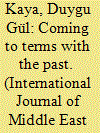

|
|
|
|
|
| Summary/Abstract |
This article examines the growing interest in questions of memory, trauma, and justice in Turkey, with a special focus on the notion of “coming to terms with the past.” Through an analysis of key academic and popular texts published between 2002 and 2013, it argues that “coming to terms with the past” is a therapeutic public discourse that rewrites national history through the temporality of trauma. In other words, this discourse reconfigures the sequence of past, present, and future as the beginning, development, and end of a case of collective trauma, applying the psychotherapeutic terminology of victimhood, healing, and forgiveness to social realities. The article offers new perspective on existing debates over “coming to terms with the past” by analyzing the limits of this therapeutic discourse and by exploring the potential and open-endedness of the politics of memory in Turkey.
|
|
|
|
|
|
|
|
|
|
|
|
|
|
|
|
| 6 |
ID:
113279
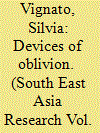

|
|
|
|
|
| Publication |
2012.
|
| Summary/Abstract |
Since the peace agreement has put an end to the 30-year-long civil conflict in the province of Aceh in Indonesia, poverty, parental loss, lack of opportunities and an old tradition have caused a growing number of Acehnese girls and boys to spend between three and ten years in residential Koranic schools [dayah or pesantren]. There, they process their experience of the conflict, be it direct or indirect. In this article, thanks to ethnographical data, the author explores this labour of transformation. An idea of resilience which is culturally based in local societies is analysed. Key issues are the difference between personal and social resilience, plus the transformations that a resilient process enhances in the very culture from which it stems. The dayah have proved very effective structures in facing the needs of the poorest Acehnese children. Nevertheless, the author argues, they tend to shape the children according to a general model that can create exclusion and crystallize pre-existing psychic suffering. This paper indicates that different visions of trauma and memory characterize different parts of the same society, and that selecting one or another is a political choice that is embedded in international policies.
|
|
|
|
|
|
|
|
|
|
|
|
|
|
|
|
| 7 |
ID:
114565
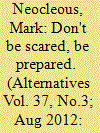

|
|
|
|
|
| Publication |
2012.
|
| Summary/Abstract |
Rather than concerning ourselves with "governing trauma" we should instead be concerned with how trauma has come to govern us. Trauma talk now comes naturally, and the article explores what all this trauma talk might be doing, ideologically and politically, especially in the context of the relationship between security and anxiety. The management of trauma and anxiety has become a way of mediating the demands of an endless security war: a war of security, a war for security, a war through security. The article therefore seeks to understand the concept of trauma and the proliferation of discourses of anxiety as ideological mechanisms deployed for the security crisis of endless war; deployed, that is, as a training in resilience. Trauma is less an issue of memory or the past and more a question of building resilience for the future. The language of trauma and anxiety, and the training in resilience that is associated with these terms, weds us to a deeply conservative mode of thinking.
|
|
|
|
|
|
|
|
|
|
|
|
|
|
|
|
| 8 |
ID:
182452
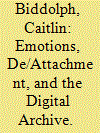

|
|
|
|
|
| Summary/Abstract |
The study of global politics is not an exercise in objectivity and rationality, but one that is embodied, personal, and deeply affective. Feminist scholarship both within and outside of International Relations (IR) have pioneered discussions of embracing our affective experiences as researchers, as well as maintaining ethical commitments to research participants and collaborators. In addition to feminist contributions, the emotional turn in IR has seen the emergence of vibrant scholarship exploring the role of emotions in sites and processes of global politics, as well as the role of emotions in the research process. In this article, I aim to contribute to this growing body of scholarship by speaking to these and other questions that explore the role of emotions in researchers’ engagement with their work. In particular, I draw on and interrogate my own emotional entanglements with the digital archives of the International Criminal Tribunal for the former Yugoslavia (ICTY). The goal of this article is to provide insights into the emotional process of reading and interpreting testimonies of violence, and to illuminate ethical concerns that arise – particularly as an ‘outsider’ – when reading and representing trauma in my research.
|
|
|
|
|
|
|
|
|
|
|
|
|
|
|
|
| 9 |
ID:
172287
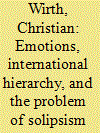

|
|
|
|
|
| Summary/Abstract |
This study offers an explanation for Beijing’s seemingly self-defeating approach to the South China Sea that distances China ever more from the regional and international communities which it wants to lead and join while drawing in the foreign military presence that it seeks to keep at a distance. Combining recent research on the role of emotions and on hierarchy in international politics, this article shows how the powerful narrative of national ‘humiliation’ and ‘rejuvenation’ has informed Chinese maritime politics. As the South China Sea became incorporated in the linear timeline of China’s 5000 year civilizational history, the US’ and its allies’ push-back against Beijing’s territorial claims deepened China’s ideational isolation. The ensuing state of solipsism increases the risk of violent confrontations.
|
|
|
|
|
|
|
|
|
|
|
|
|
|
|
|
| 10 |
ID:
185527
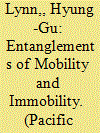

|
|
|
| 11 |
ID:
182854
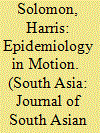

|
|
|
|
|
| Summary/Abstract |
This paper is an ethnographic account of traumatic brain injuries (TBIs) based on a study of a public hospital trauma ward in urban India. It explores the contexts, causes and consequences of TBIs in order to make several broader claims. Across two case studies, I argue that epidemiological transitions towards non-infectious disease regimens must be understood as problems of somatic movement. The implication is that bodies make transitions through actual and imagined changes in bodily movements that define how persons become patients, how traumatic injury pulls on clinical resources, and how differences in gender, sexuality, class and caste affect the social dynamics of brain injury in urban settings at every turn.
|
|
|
|
|
|
|
|
|
|
|
|
|
|
|
|
| 12 |
ID:
114571
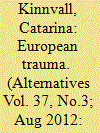

|
|
|
|
|
| Publication |
2012.
|
| Summary/Abstract |
This article examines the unfolding of traumas as structural and sociopsychological narratives focused on the bordering of identity and the governing of past present and future. Proceeding from a Lacanian conception of trauma and a Foucauldian understanding of governmentality, the analysis is centered on hegemonic counternarratives, even crises, involving the bordering of both Islam/Muslim identity and Europe/national identity. This "European trauma," or psychological moment, is exemplified through events in London 2005 and Norway 2011. It is perceived in terms of Chosen Traumas and Chosen Glories, the mythologization of past events that are retold, reinvented, and awarded new meanings in the present. Such traumas and glories can create a foundation for governing practices in which hegemonic interpretations of identity turn into normalizing narratives that justify violence. However, the governing of narratives is a contested process and alternative narrative understandings in terms of everyday practices can stimulate social resistance and psychological resilience, eventually challenging the normalizing bordering processes encountered in Europe today.
|
|
|
|
|
|
|
|
|
|
|
|
|
|
|
|
| 13 |
ID:
151181
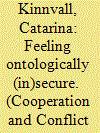

|
|
|
|
|
| Summary/Abstract |
This article proceeds from a conceptual analysis of how ontological (in)security is constructed in terms of ‘security-of-being’ in which identity dynamics are explicated in socio-psychological terms. Of particular interest is how such dynamics transcend the boundaries of individual self/other constructions to define communities and states, and how these dynamics are transformed in times of trauma and crises. Narratives of everyday traumas are especially significant in creating notions of gendered space and (in)security, and for securitising subjectivities. This article thus investigates a number of theoretical propositions and developments involved in recent debates on the emotional dimension of ontological (in)security and its relationship to states, traumas and the securitisation of subjectivity. A gendered perspective of these debates allows us to analyse, and perhaps move beyond, some of the problematic aspects of the ontological security literature as originally developed by Laing and Giddens, and later on by sociologists and international relations scholars. Using the case of India as an example, the article shows how narrative reconstructions of traumas and collective memory shape gendered space and the search for ontological security, and how attempts to govern these events and practices impact on notions of gendered space and ontological insecurity.
|
|
|
|
|
|
|
|
|
|
|
|
|
|
|
|
| 14 |
ID:
114569
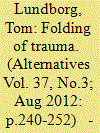

|
|
|
|
|
| Publication |
2012.
|
| Summary/Abstract |
This article examines the government of trauma by examining the rebuilding of Ground Zero as a practice of folding the traumatic event, of capturing the traumatic event by containing it within the forms of what can be said and what can be seen. Something always goes missing in this process: the ungraspable and inexpressible dimension of trauma, which ultimately resists capture. On this basis, it considers different architectural designs and proposals as expressions of different strategies of folding the traumatic event. One strategy seeks to capture and contain the traumatic event through the production of specific forms of seeing and speaking in the social field. A second strategy points to our inability to capture the traumatic event through folding. The conclusion considers how these two strategies can be used to analyze the political significance of architecture in the discourses of the war on terror.
|
|
|
|
|
|
|
|
|
|
|
|
|
|
|
|
| 15 |
ID:
176583
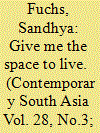

|
|
|
|
|
| Summary/Abstract |
May 2015 witnessed the Dangawas massacre in Rajasthan’s Nagaur district, one of the most brutal caste atrocities in recent Indian history, which resulted in the death of five Dalits of the Meghwal caste at the hands of a Jat mob. Across Rajasthan, the violence of Dangawas, which marked the culmination of a decades-long land conflict, has become synonymous with the continuing reality of caste-based violence and the law that is meant to address it: The 1989 SC/ST Prevention of Atrocities Act. However, Meghwal survivors in Dangawas often articulate scepticism about the ability of law to provide them with a true sense of restitution. Emphasising a desire for social space (jagah), which they map onto the land at the root of the bloodshed, Dangawas’ Meghwal survivors are caught in a post-traumatic moment marked by fear of further suffering. The memory of inconceivable violence, which has left them alienated in a divided village, has not only made renewed attempts of assertion, and demands for radical justice temporarily inconceivable, but has also led Dangawas’ survivors to ask questions about their own agency and the meaning of sociality in an environment where members of a dominant caste still see themselves as guarantors of economic and social belonging.
|
|
|
|
|
|
|
|
|
|
|
|
|
|
|
|
| 16 |
ID:
148172
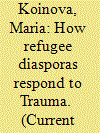

|
|
|
|
|
| Summary/Abstract |
The kind of support refugees receive to help them deal with the stresses of displacement can determine whether they will be a constructive or a divisive force.
|
|
|
|
|
|
|
|
|
|
|
|
|
|
|
|
| 17 |
ID:
184735
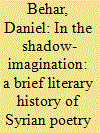

|
|
|
|
|
| Summary/Abstract |
This article argues that when poetic practice in Syria turned to a register of modernity, many of its idioms darkened to a poetics of trauma and catastrophe. By highlighting a Syrian manifesto for the poetics of catastrophe and taking two poets who stylistically stand at polar opposites, I aim to show the diversity of forms in which Syrian witness poetry came into being and set it in a larger framework of efforts to anthologise and globalise twentieth century poetry from sites of violent political conflict. In doing so, I also trace the literary historical trajectories that informed its making in Syria and continued to steer its course well after 2011. Aside from original poetry, the ecosystem of the culture of catastrophe includes critical discourse, novels, cinema, media products, and literary translation. I will address some, not all, of the elements in this repertoire as they relate to poetic production.
|
|
|
|
|
|
|
|
|
|
|
|
|
|
|
|
| 18 |
ID:
152852
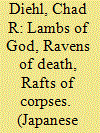

|
|
|
|
|
| Summary/Abstract |
This article explores the poetry written by survivors of the atomic bombing of Nagasaki to elucidate the history of atomic memory in the city. Looking closely at works by three poets, the article discusses how poetry served as a medium for the survivors to grapple with traumatic memory and convey the atomic experience in meaningful ways that both provided catharsis and challenged a landscape of memory that ignored their personal trauma and suffering. An analysis of their verse also informs our understanding of the historical nature of war trauma more generally.
|
|
|
|
|
|
|
|
|
|
|
|
|
|
|
|
| 19 |
ID:
192865
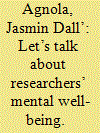

|
|
|
|
|
| Summary/Abstract |
Although mental health concerns among university populations are on the rise, discussions of academia-related trauma rarely occur in published outlets. They are usually limited to informal talks and the private exchange of anecdotes during conferences and workshops. This is problematic because accounts of how to mitigate stress, anxiety and depression in the academic environment are valuable for both early-career and senior researchers. In being honest about the strategies that I have developed to protect my mental well-being, both during my fieldwork in Central Asia and the academic environment more generally, I do not wish to make totalizing generalizations about researchers’ trauma experiences in our discipline. By contrast, I hope that my account presented here will invite further academic discussion about the possibility of academia-related trauma and its implications for scholars’ work and mental well-being.
|
|
|
|
|
|
|
|
|
|
|
|
|
|
|
|
| 20 |
ID:
188074
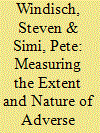

|
|
|
|
|
| Summary/Abstract |
While progress has been made to understand mid-life correlates associated with extremist participation, much less research focuses on adolescent risk factors. The purpose of the current study is to expand upon the focus on individual-level correlates by assessing the extent and nature of childhood adversity among a sample of former white supremacists. The current study relies on in-depth life-history interviews with ninety-one North America-based former white supremacists and the Adverse Childhood Experiences questionnaire. Overall, the current sample contained elevated rates of childhood risk factors with 63 percent of participants having experienced four or more adverse experiences during the first eighteen years of their lives (as compared to 55 percent of a comparison “high risk” sample and 16 percent of the U.S. general population sample). Furthermore, participants discussed a variety of maladaptive coping strategies associated with adversity that generated vulnerabilities to adolescent misconduct and extremism early in the life-course. Our findings indicate that extremist onset does not begin with a single life event but rather is generated, and further exacerbated by the cumulative impact of multiple adverse experiences during childhood.
|
|
|
|
|
|
|
|
|
|
|
|
|
|
|
|
|
|
|
|
|